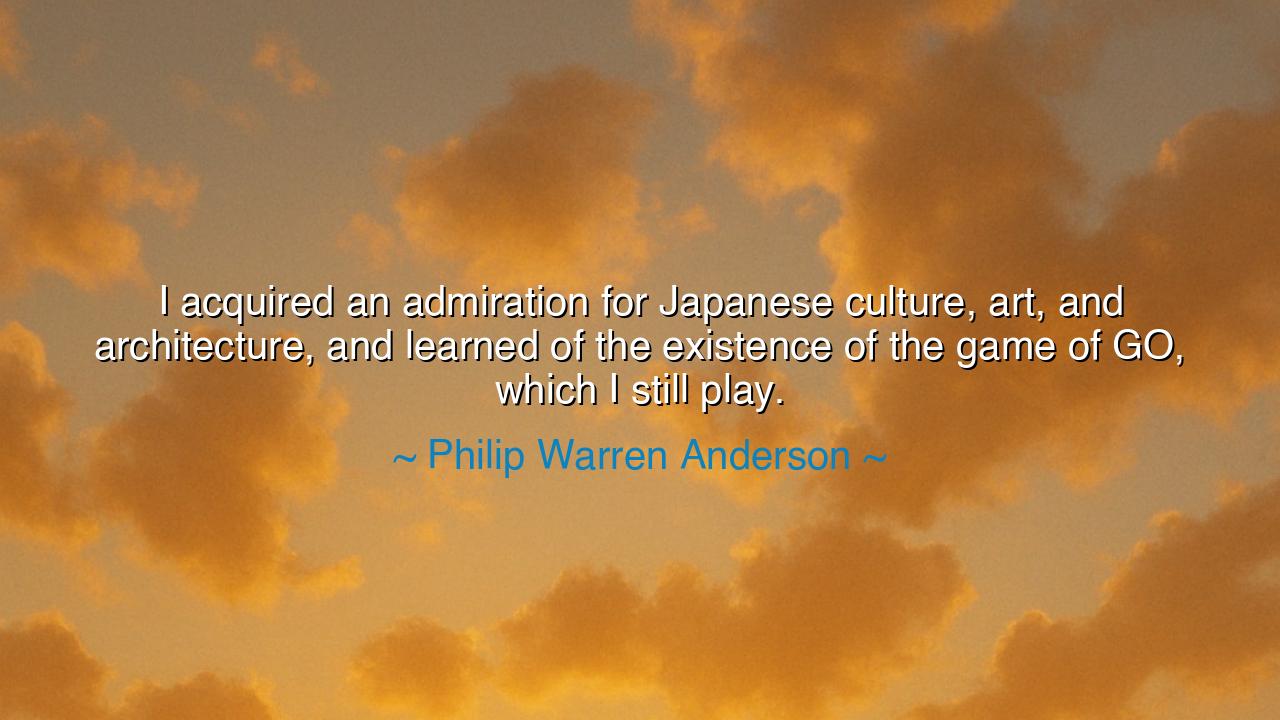
I acquired an admiration for Japanese culture, art, and
I acquired an admiration for Japanese culture, art, and architecture, and learned of the existence of the game of GO, which I still play.






Host:
The room was quiet, the soft rustling of pages the only sound breaking the stillness. Jack was sitting at the desk, lost in thought as he skimmed through a book, while Jeeny sat across from him, her fingers absentmindedly tracing the rim of her tea cup. There was a certain calm to the evening, an unspoken sense of curiosity hanging between them, as though they were both waiting for the right moment to share their thoughts.
Jeeny:
(She looks up from her cup, her voice thoughtful and inquisitive.)
“I came across a quote by Philip Warren Anderson today. He said, ‘I acquired an admiration for Japanese culture, art, and architecture, and learned of the existence of the game of GO, which I still play.’ It made me think about how certain cultures can have such a profound impact on us, shaping the way we see the world. Do you think there’s something transformative about immersing ourselves in another culture, whether it’s through art, philosophy, or even something like a game?”
Jack:
(He pauses, looking up at her, his voice reflective as he processes the question.)
“Definitely. I think immersing yourself in another culture, especially one that’s as rich and layered as Japanese culture, can completely shift the way you see things. Japanese art, architecture, and even the game of GO — they all carry such deep meaning and history. There’s a certain mindfulness to everything, a respect for balance and precision. I imagine that playing GO, with its complex strategy and focus, is not just about winning the game, but about embracing patience and long-term thinking. It’s like a whole new lens through which to view the world.”
Jeeny:
(She nods, her voice calm, almost coaxing him to dive deeper into the idea.)
“That’s a great way to put it. Japanese culture often emphasizes simplicity, balance, and mindfulness, which are values that extend far beyond art and architecture. Even something like the game of GO, which seems so simple on the surface, becomes a practice in strategy and reflection. The moves you make in the game are a reflection of how you think, how you approach challenges, and how you plan for the long term. It’s almost as if it teaches you to be present, but also mindful of the future, a balance that’s hard to achieve in our fast-paced, instant-gratification world.”
Jack:
(Smiling slightly, his voice more engaged, as he reflects on the deeper connection between culture and personal growth.)
“I think that’s the beauty of immersing yourself in a culture like Japan’s. It challenges the way we think and live, in a way that encourages deeper reflection. With GO, for example, there’s this recognition that every move counts, and that the game isn’t just about the immediate. It’s about the long game — the strategy, the patience, the foresight. I can see how something like that would resonate deeply, especially in a world where we’re often focused on quick results and immediate satisfaction.”
Jeeny:
(She smiles, her tone gentle, as if offering a quiet insight.)
“It’s like learning to slow down, to appreciate the journey rather than just racing toward the end. The focus on balance, whether in art, architecture, or a game like GO, forces you to think deeper, to reflect on your choices and their long-term impact. And I think that can be transformative. You start to approach life with a sense of patience and awareness, rather than constantly chasing after the next thing.”
Jack:
(Sitting back, his voice softer, almost as if internalizing a new perspective.)
“Yeah, I think that’s something we could all benefit from — taking the time to learn from cultures that prioritize mindfulness and patience. In our world, we’re often taught to rush, to do more, to achieve more. But maybe the key to success and peace lies in slowing down, being more thoughtful in our actions, and thinking about the bigger picture. It’s like that balance between strategy and presence.”
Jeeny:
(She nods, her voice calm, almost as if echoing his thoughts.)
“Exactly. There’s something powerful about learning from a culture that values patience, balance, and long-term thinking. It teaches us to be mindful, to be present in the moment while also being aware of the future. And that’s not just about playing a game; it’s about how we approach life itself.”
Host:
The conversation lingers, the air filled with a quiet understanding. Jack and Jeeny sit together, each reflecting on the power of immersing oneself in a different culture and the transformative effect it can have on how we approach not just challenges, but life itself. The world outside continues its rhythm, but inside, there’s a shared realization that the wisdom of other cultures, whether through art, architecture, or games like GO, can teach us the importance of balance, mindfulness, and long-term vision. These lessons have the power to shape the way we live, if only we take the time to listen and learn.






AAdministratorAdministrator
Welcome, honored guests. Please leave a comment, we will respond soon